Fragile States

Working Paper 201/2025: A Glance at International Challenges of Refugee Crises in the New Millenium
Abstract:
This study investigates the intricate relationship between forced displacement and human development. By examining refugee outflows from key regions, this paper seeks to comprehend the factors driving these movements and their development implications. Employing a qualitative case study methodology, the research focuses on the five main refugee outflow countries in 2023. The paper finds that the most relevant factors that induce displacement are political violence, especially civil conflict, and climate change. Refugee emergencies have multiple aggravating elements, like economic crises, food insecurity, and infrastructure damage. Despite not identifying strong correlations between displacement and human development (measured through HDI), except for Syria, the study reveals that these emergencies are simultaneously humanitarian and developmental challenges. Repercussions are more prominent in the Global South since it is the origin and the destination of over 70% of displaced people. The findings reiterate the urgency for integrated policy responses that combine development and humanitarian efforts.
Cite this Working Paper:
Rocha, Marcela e Eduardo Moraes Sarmento (2025). “A glance at international challenges of refugee crises in the new millenium”. CEsA/CGS – Documentos de trabalho nº 201/2025
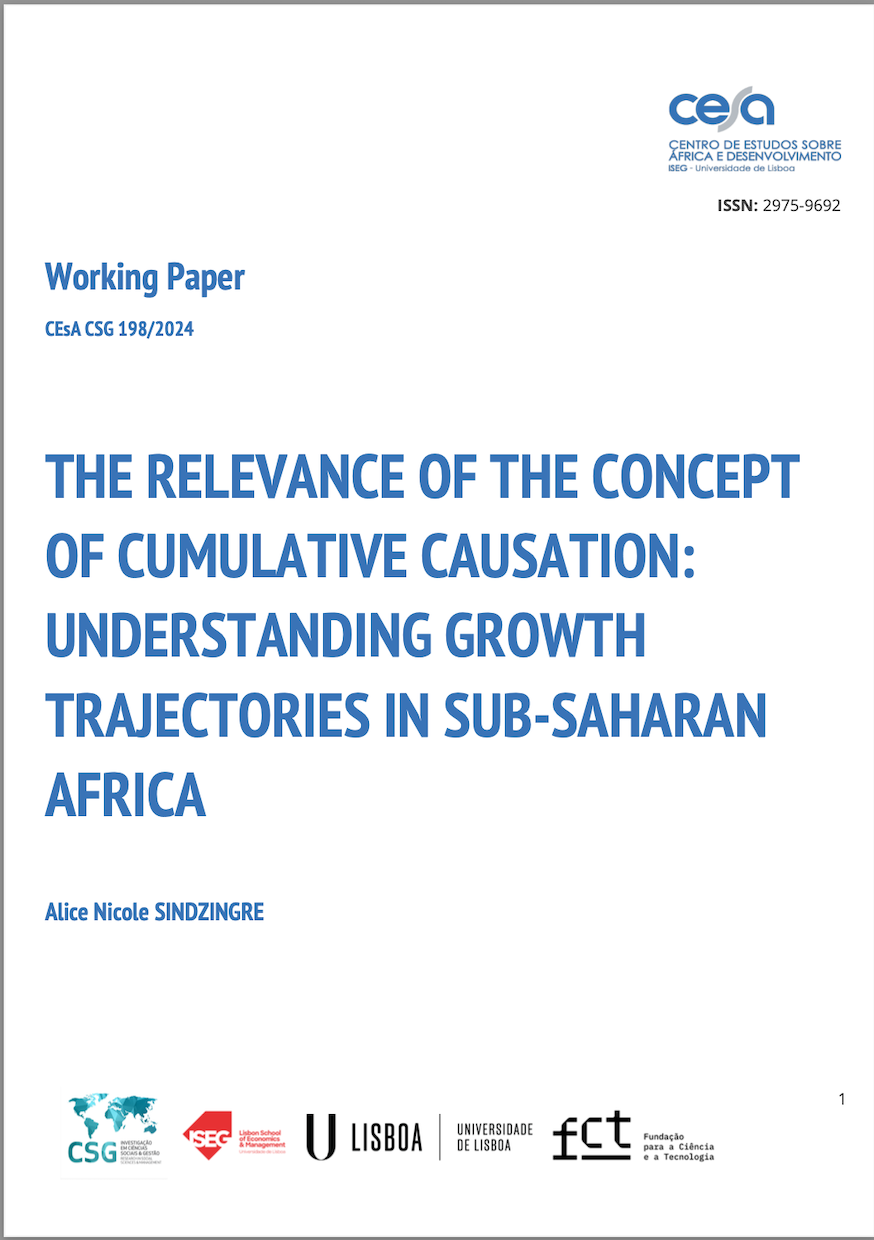
Working Paper 198/2024: The Relevance of the Concept of Cumulative Causation: Understanding growth trajectories in Sub-Saharan Africa
Abstract:
Differences in growth trajectories among countries – including the possibility of divergence -, are a central issue in economics. Mainstream economics explain growth processes via varieties of neoclassical models, even improved with concepts such as institutions. Yet such models have difficulties in providing accurate accounts of the growth trajectories of many developing countries, notably low-income ones. It is argued that the growth paths of low-income countries are more appropriately explained by the theoretical framework that relies on the nexus of concepts of cumulative causation, non-linearities, threshold effects, self-reinforcing processes, irreversibility, path dependence and traps – though this approach remains marginal in mainstream economic analyses of growth and development. Firstly, this nexus of concepts is a powerful framework concerning the possibility and explanation of dynamic divergence regarding growth between countries, as it exhibits properties such as: the possibility of cumulative, dynamically self-reinforcing, processes; the existence of thresholds and tipping points; multiple equilibria. Secondly, cumulative causation, by definition, involves a combination of causes: its conceptual framework allows for the integration of several dimensions – economic, political, social, cognitive -, whose combination results in either virtuous or vicious circles. In developing countries, these causes (and their coalescence) typically consist in economic structures (e.g., commodity-based export markets), political institutions and social norms (predatory regimes, high inequality) as well as types of public policies.
Cite this Working Paper:
Sindzingre, Alice Nicole (2024). “The Relevance of the Concept of Cumulative Causation: Understanding growth trajectories in Sub-Saharan Africa”. CEsA/CGS – Documentos de trabalho nº 198/2024
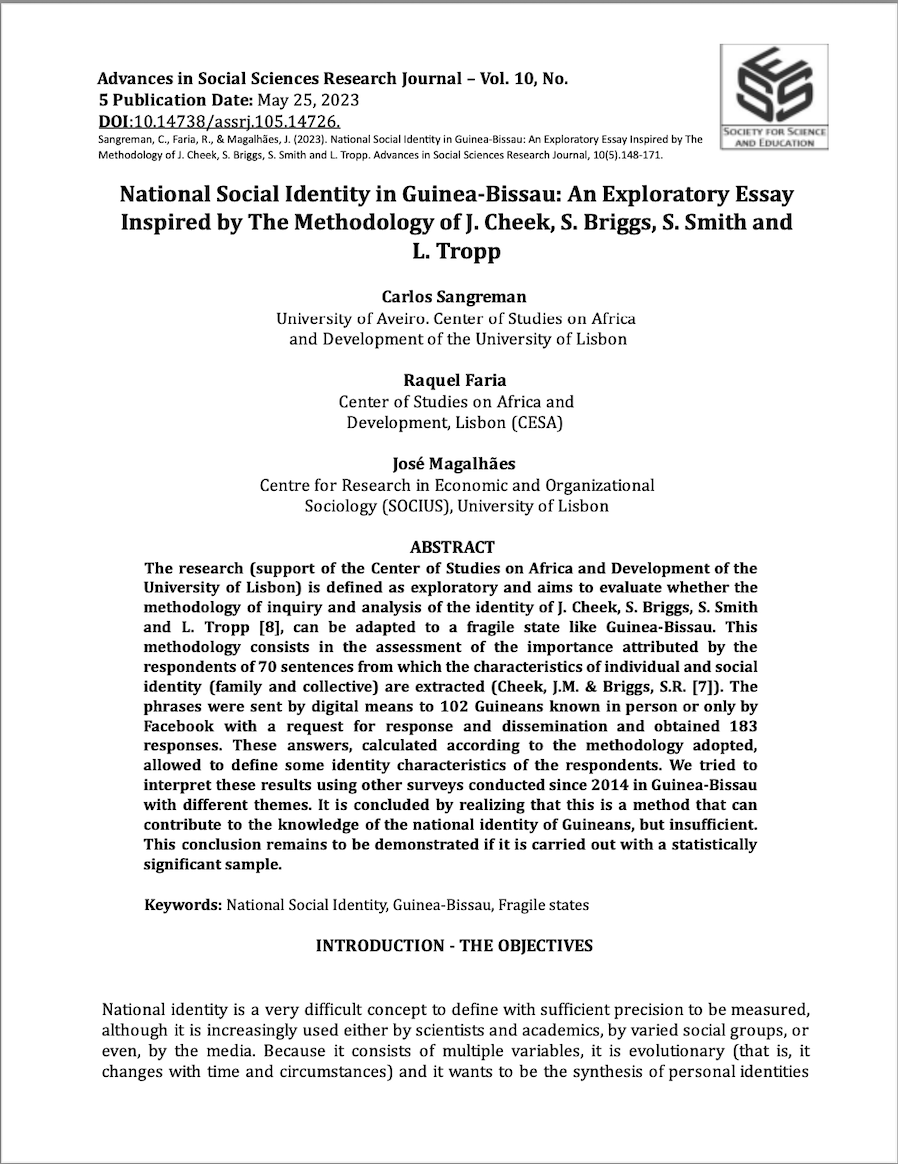
National Social Identity in Guinea-Bissau: An Exploratory Essay Inspired by the Methodology of J. Cheek, S. Briggs, S. Smith and L. Tropp
Abstract:
The research (supported by the Centre for African and Development Studies of the University of Lisbon) is defined as exploratory and aims to evaluate whether the methodology of inquiry and analysis of the identity of J. Cheek, S. Briggs, S. Smith and L. Tropp, can be adapted to a fragile state like Guinea-Bissau. This methodology consists in the assessment of the importance attributed by the respondents of 70 sentences from which the characteristics of individual and social identity (family and collective) are extracted (Cheek, J. M. & Briggs, S. R.). The phrases were sent by digital means to 102 Guineans known in person or only by Facebook with a request for response and dissemination and obtained 183 responses. These answers, calculated according to the methodology adopted, allowed to define some identity characteristics of the respondents. We tried to interpret these results using other surveys conducted since 2014 in Guinea-Bissau with different themes. It is concluded by realizing that this is a method that can contribute to the knowledge of the national identity of Guineans, but insufficient. This conclusion remains to be demonstrated if it is carried out with a statistically significant sample.
Quotation:
Sangreman, C., Faria, R., & Magalhães, J. (2023). National Social Identity in Guinea-Bissau: An exploratory essay inspired by the methodology of J. Cheek, S. Smith and L. Tropp. Advances in Social Sciences Research Journal, 10(5).148-171.
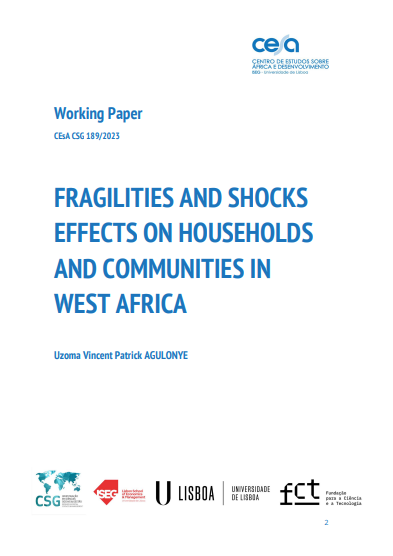
Working Paper 189/2023: Fragilities and shocks effects on households and communities in West Africa
Abstract:
Shocks are drivers of fragility yet most works on fragility in Africa use the tag “fragile state(s)” with less focus on the drivers of fragility in its institutions, states, and economies. Shocks are cardinal to the entrenchment or stability of any system. The Covid-19 pandemic revealed how fragile the world is including the “developed” or “advanced” systems. Today, households, businesses, and communities in most parts of Sub-Saharan Africa suffer the effects of a triple whammy (climate change, the pandemic and Russia/Ukraine War) including effects of history and an unfavourable global system all of which leaves them in hunger, poverty and vulnerable conditions. Fragilities and Shocks Effects on Households and Communities in West Africa used secondary sources to revisit the effects of these shocks on households, and communities in West Africa through the lens of common resources. The recent shocks effects prevalent in all these countries is higher than reported and would affect West Africa´s growing population in the foreseeable future with the absence of safety nets or effective interventions. The absence of shocks preparation in the subregion is not sustainable and adds up to the sustenance of the revolving circle of fragility in the subregion.
Quotation:
Agulonye, U.V.P. 2023. “Fragilities and Shocks Effects on Households and Communities in West Africa“. Instituto Superior de Economia e Gestão – CEsA/CSG – Documentos de Trabalho nº 189/2023
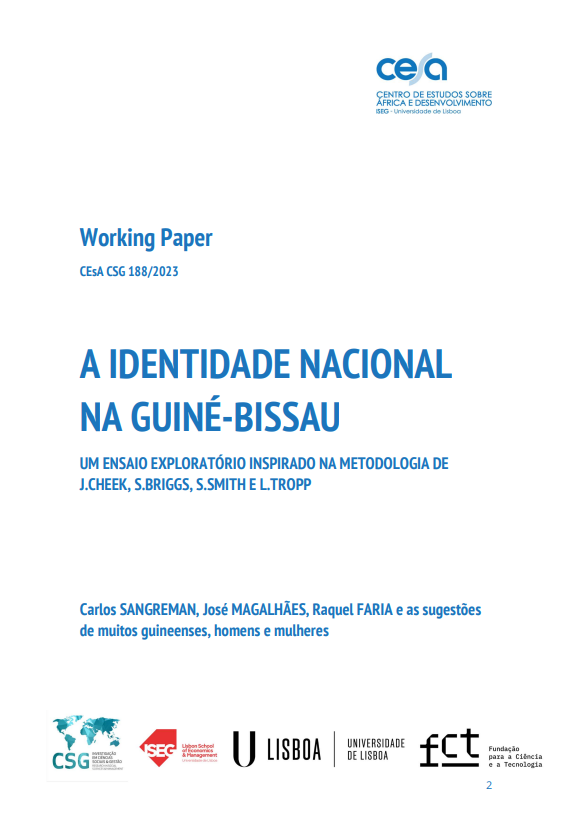
Working Paper 188/2023: A identidade nacional na Guiné-Bissau: um ensaio exploratório inspirado na metodologia de J.Cheek, S.Briggs, S.Smith e L.Tropp
Abstract:
The investigation of A Identidade Nacional na Guiné-Bissau – Um ensaio exploratório inspirado na metodologia de J.Cheek, S.Briggs, S.Smith e L.Tropp is defined as exploratory and aims to evaluate whether the methodology of inquiry and analysis of identity. created by J. Cheek, S. Briggs, S. Smith and L. Tropp, can be adapted to a fragile state like Guinea-Bissau. This methodology consists in the assessment of the importance attributed by the respondents of 70 sentences from which the characteristics of individual and social identity (family and collective) are extracted. The sentences were sent by digital means to 102 Guineans known in person or only by Facebook with request for response and dissemination and obtained 183 responses. These answers, calculated according to the methodology adopted, allowed to define some identity characteristics of the respondents. We tried to interpret these results using other surveys made since 2014 in Guinea-Bissau with different themes. It is concluded by realizing that this is a method that can contribute to the knowledge of the national identity of Guineans, but insufficient. This conclusion remains to be demonstrated if it is carried out with a statistically significant sample.
Quotation:
Sangreman, C., Magalhães, J., Faria, R. (2023). “A Identidade Nacional na Guiné-Bissau – Um ensaio exploratório inspirado na metodologia de J.Cheek, S.Briggs, S.Smith e L.Tropp“. Instituto Superior de Economia e Gestão – CEsA/CSG – Documentos de Trabalho nº 188/2023
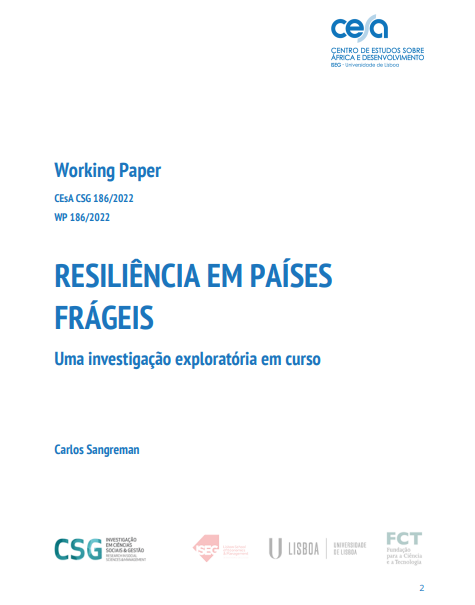
Working Paper 187/2022: Resiliência em Países Frágeis – uma investigação exploratória em curso
Abstract:
Resiliência em Países Frágeis – uma investigação exploratória em curso started in 2017 when the director of a service directorate of the Joint Research Center, at ECAS in Geneva, invited Prof. Carlos Sangreman to an exploratory study on resilience in Guinea-Bissau with the title Context specific risk perception and resilience patterns for individuals and communities (urban/non-urban) – the case of people in Guinea-Bissau. The study was carried out on the basis of the survey whose form is included in this Working Paper, gave rise to the attached article in an international journal and to a PhD thesis in progress at the University of Aveiro. The partnership between JRC and Cesa also involved Professor Alexandre Abreu and Master Jessica Santos, as well as Carlos Sangreman. From the JRC were Chistophe Quétel, Guy Bourdin and Ilektra Lemi. A survey was conducted in all regions and capital of the country to 210 households, with a previous pilot to 36 to refine the questionnaire in this partnership: project Enquêtes de terrain sur la perception du risque et la résilience des ménages en Guinée-Bissau Projet: Ares(2018)2381703 – 04/05/2018. Centre Commun de Recherche (JRC) de la Commission Européenne, Direction E, and CESA – Centre for Studies on Africa and Development of the University of Lisbon.
Quotation:
Sangreman, C., Martins, D., Quetel, C. Abreu, A. e Bourdin, G. (2022). “Resiliência em Países Frágeis – uma investigação exploratória em curso”. CEsA/CSG/ISEG/ULisboa – Documentos de Trabalho nº 186/2022
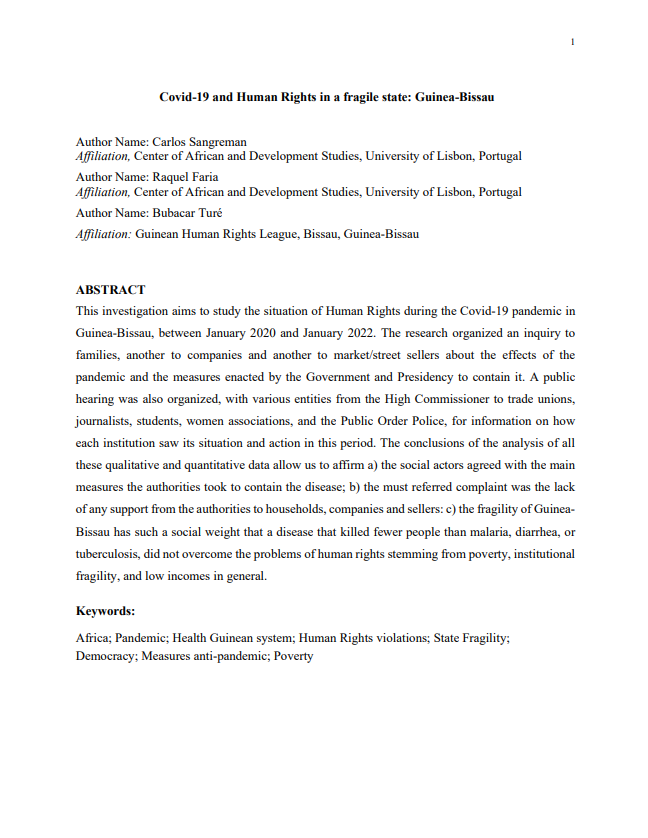
COVID-19 and Human Rights in a Fragile State: Guinea-Bissau
Abstract:
COVID-19 and Human Rights in a Fragile State: Guinea-Bissau aims to study the situation of Human Rights during the Covid-19 pandemic in Guinea-Bissau, between January 2020 and January 2022. The research organized an inquiry to families, another to companies and another to market/street sellers about the effects of the pandemic and the measures enacted by the Government and Presidency to contain it. A public hearing was also organized, with various entities from the High Commissioner to trade unions, journalists, students, women associations, and the Public Order Police, for information on how each institution saw its situation and action in this period. The conclusions of the analysis of all these qualitative and quantitative data allow us to affirm a) the social actors agreed with the main measures the authorities took to contain the disease; b) the must referred complaint was the lack of any support from the authorities to households, companies and sellers: c) the fragility of Guinea-Bissau has such a social weight that a disease that killed fewer people than malaria, diarrhea, or tuberculosis, did not overcome the problems of human rights stemming from poverty, institutional fragility, and low incomes in general.
Quotation:
Sangreman, C., Faria, R. T., & Turé, B. (2022). COVID-19 and Human Rights in a Fragile State: Guinea-Bissau. In P. Andrade, & M. Martins (Ed.), Handbook of Research on Urban Tourism, Viral Society, and the Impact of the COVID-19 Pandemic (pp. 341-360). IGI Global. https://doi.org/10.4018/978-1-6684-3369-0.ch018
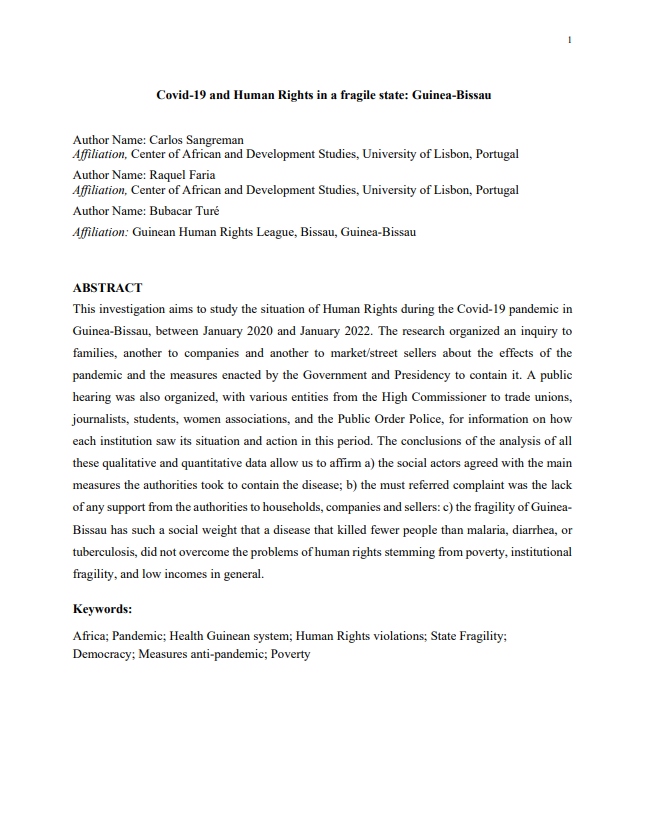
Covid-19 and Human Rights in a fragile state : Guinea-Bissau
Abstract:
COVID-19 and Human Rights in a Fragile State: Guinea-Bissau aims to study the situation of Human Rights during the Covid-19 pandemic in Guinea-Bissau, between January 2020 and January 2022. The research organized an inquiry to families, another to companies and another to market/street sellers about the effects of the pandemic and the measures enacted by the Government and Presidency to contain it. A public hearing was also organized, with various entities from the High Commissioner to trade unions, journalists, students, women associations, and the Public Order Police, for information on how each institution saw its situation and action in this period. The conclusions of the analysis of all these qualitative and quantitative data allow us to affirm a) the social actors agreed with the main measures the authorities took to contain the disease; b) the must referred complaint was the lack of any support from the authorities to households, companies and sellers: c) the fragility of Guinea-Bissau has such a social weight that a disease that killed fewer people than malaria, diarrhea, or tuberculosis, did not overcome the problems of human rights stemming from poverty, institutional fragility, and low incomes in general.
Quotation:
Sangreman, C., Faria, R. T., & Turé, B. (2022). COVID-19 and Human Rights in a Fragile State: Guinea-Bissau. In P. Andrade, & M. Martins (Ed.), Handbook of Research on Urban Tourism, Viral Society, and the Impact of the COVID-19 Pandemic (pp. 341-360). IGI Global. https://doi.org/10.4018/978-1-6684-3369-0.ch018
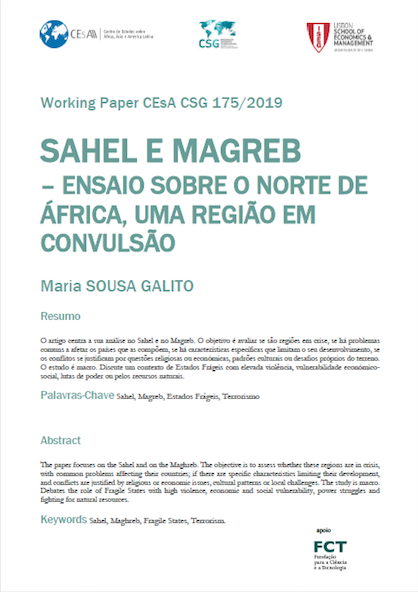
Working Paper 175/2019: Sahel e Magreb: Ensaio sobre o Norte de África, uma região em convulsão
Abstract:
Sahel e Magreb : ensaio sobre o norte de África, uma região em convulsão focuses on the Sahel and on the Maghreb. The objective is to assess whether these regions are in crisis, with common problems affecting their countries; if there are specific characteristics limiting their development, and conflicts are justified by religious or economic issues, cultural patterns or local challenges. The study is macro. Debates the role of Fragile States with high violence, economic and social vulnerability, power struggles and fighting for natural resources. The paper is subdivided into two chapters. The first compares the Sahel and Maghreb regions, with a short analysis for each country that constitutes them, since the spaces are very related to each other, since traffickers transit along the trade routes of the ancient caravans of the desert caravans, or less watched over by law enforcement agents or controlled by guerrillas or or controlled by guerrilla or terrorist groups. Maps and statistical tables are offered for appropriate comparisons. The second chapter is about the influence of the Arab Spring in North Africa, with reference its main causes and consequences. Given that these states are considered fragile by the international community, the question is whether they are failures and why they have serious problems of governance, internal stability or the stability of their borders. It assesses the fight against terrorism, in a sensitive in a sensitive context where former guerrilla fighters are still active, part of militias or terrorist groups or claiming possession of natural resources, reclaiming for themselves the sources of income and the channels of distribution. sources of income and channels of distribution. Different types of violence or organised crime are also differentiated crimes.
Quotation:
Galito, Maria Sousa (2019). “Sahel e Magreb : ensaio sobre o norte de África, uma região em convulsão”. Instituto Superior de Economia e Gestão – CEsA/ CSG – Documentos de Trabalho nº 175/2019.





